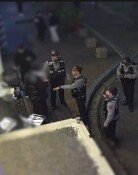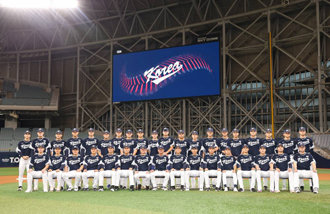Court deals hard blow to destroyers of Republic of Korea
Court deals hard blow to destroyers of Republic of Korea
Posted December. 20, 2014 05:27,
The Constitutional Court ordered the dissolution of a pro-North Korea minor opposition Unified Progressive Party (UPP) in the first case in which the administration petitioned for the disbandment of a political party South Korea adopted its first constitution in 1948. Even justices who are considered moderate or progressive decided that the UPPs purposes and activities seriously undermined the "basic democratic order" stipulated by the Constitution. The landmark decision is a stern judgment that safeguards the Constitution by not tolerating a political party that undermines the free democratic system.
"The genuine goal and the activities of the UPP are to first achieve progressive democracy through violence and to finally adopt North Korea-style socialism," chief justice Park Han-cheol said, explaining the top courts ruling. (The UPP) caused concrete danger that could do practical harm to the basic democratic order. He stressed that there is no other alternative to dismantle the UPP in order to eliminate the risk of the party operating with state subsidies from taxpayers money under the disguise of a lawful political party but attempting to destroy the basic democratic order.
The Constitutional Court decided that the UPPs hidden intention to subvert South Koreas free democratic system by following North Koreas revolutionary strategy against the South became a reality in the case of Lee Seok-ki, a leading UPP member, who had been convicted of plotting to overthrow the South Korean government. The court made it clear that the plan to resort to violent means, including destroying key infrastructure, manufacturing and stealing weapons and disturb telecommunications in the South in the event of a war with the communist North, was the UPPs responsibility, rather than being limited to some of its members. At the time of Lees appeal trials, an appeals court found him not guilty of plotting rebellion, citing a lack of evidence to prove the existence of Lees so-called Revolutionary Organization (RO). However, the Constitutional Court ruled that it was also the UPPs activity, as the partys core leading members held RO meetings while the party tried to protect them. Participants in the RO meetings were all UPP members, including its lawmakers Lee Seok-ki, Kim Jae-yeon and Kim Mi-hui and senior party officials.
The Constitutional Court said that the UPPs leading ideology of progressive democracy was almost identical to the Norths revolutionary strategy against the South. Since its founding two years ago, the UPP turned a blind eye to North Koreas hereditary power succession, nuclear weapons development and human rights abuses, while following Pyongyangs call for the withdrawal of U.S. troops from the South and the abolishment of Seouls National Security Law. When the North conducted its third nuclear test in 2013, the UPP defended Pyongyang, saying that the provocation resulted from a lack of U.S.-North Korea dialogue and the ruptured inter-Korean relations. All lawmakers of the party refused to participate in the National Assemblys adoption of a resolution denouncing the nuclear test. Even though the North Korea-style socialism based on one-man dictatorship conflicted with the Souths Constitutional values of basic democratic order, UPP leader Lee Jung-hee wrote on her blog on Oct. 8, 2010 that it was her and her partys decision not to discuss the Norths third-generation hereditary power succession. She has remained silent about North Korea, while launching excessive attacks against South Korea.
The Constitutions system for disbandment of political parties is for the protection of parties from the states unjust exercise of its power and also for the protection of the state and social order from unconstitutional parties. The system of the courts judgment on the disbandment of a political party is of defensive nature to prevent an unconstitutional partys activities of destroying the Constitution. Lee Seok-kis rebellion case, the UPPs party primary rigging, a violence case involving its central committee and its manipulation of an electoral district in Seoul all justify the Constitutional Courts decision that the UPP is not based on a democratic legal order.
Although ideological diversity should be protected, we cannot tolerate even the enemies of free democracy. The Constitutional Courts latest decision has made it clear that those who undermine democracy must not be allowed to form a political party, gain parliamentary seats and receive state subsidies. Germany, which experienced the nightmare of the Nazis, strictly maintains the motto We cannot give freedom to the enemies of freedom.
The fact that the court said that South Koreas unique situation of confronting North Korea must also be considered speaks volume in that the statement has set a standard for a political party that our society can tolerate. In 1956, West Germanys Constitutional Court ordered the dissolution of the Communist Party of Germany, saying that it was possible without actual danger posed to basic democratic order. The German court also found that a political party posting threats to the states existence and running counter to the constitutional order could not be tolerated at a time of ideological conflicts under the Cold War. North Korea has declared 2015 as the year of the completion of the great war for reunification, while trying to build up its special forces and make small and light nuclear warheads.
After the ruling, UPP leader Lee Jung-hee claimed the decision represented the tragic end of South Korea`s democracy. The progressives who speak for minorities and the underprivileged should be respected, but progressivism is possible only within the boundaries of the Constitution and law. Those who follow North Korea-style socialism must not be tolerated. The UPPs dissolution should become an opportunity for the realignment of the progressive groups and pave the way for the growth of sound progressives. The experience of disbanding an unconstitutional political party that jeopardizes our system will make the democratic party system even healthier.
The ruling immediately deprived the UPPs five lawmakers and 37 local council members of their seats. The party has also been forced to forfeit all state subsidies, with its assets reverted to the state coffers. The party has received a total of 16 billion won (14.6 million U.S. dollars) in state subsidies since its founding in 2011. All the funds came from taxpayers money. It is deplorable that taxpayers money was spent to nurture Constitution-destroying forces.
The main opposition New Politics Alliance for Democracy (NPAD) should feel responsible for its role in nurturing the pro-North Korea forces by becoming their host. In the run-up to parliamentary elections in 2012, the NPAD paved the way for the UPPs entry into the National Assembly by forming an alliance with the UPP. Even after the UPPs pro-North Korea nature was revealed, leading NPAD members, including Moon Hee-sang and Moon Jae-in, spoke up against the UPPs dissolution. NPAD spokesperson Park Soo-hyun commented, "While our party accept the Constitutional Courts ruling with a heavy heart, we are serious concerned about the damage to democracys basic freedom of political parties. The comment was contradictory, indicating the partys lack of repentance for helping the UPP into the National Assembly.
In order to protect the Republic of Korea, phony progressives and guised pro-democracy forces must be removed. However, we do not even have a law for forcibly disbanding enemy-benefiting organizations. Among 13 groups that have been declared by the judiciary as enemy-benefitting organizations, five are still active, using the same name. Isolating groups that undermine our free democratic system and are loyal to North Korea is the minimal self-defense for the protection of the Republic of Korea. To this end, the National Assembly should speed up the legislation of relevant laws.
The government should make sure to take follow-up measures smoothly. It must prevent the UPPs remnants from founding a new political party under a clever disguise. We cannot rule out the possibility that they go underground or join hands with existing left-wing groups to stage violent activities. The Constitutional Courts ruling has the authority as the final judgment that can no longer be contested. Refusing to accept the ruling is an act of negating democracy and the rule of law.
Headline News
- Pres. Yoon addresses the nation at a press conference
- LX Group chairman gifts 100 million won to employee family welcoming quadruplets
- Tax-exempt shared offices in rural areas misused as tax havens
- President-Elect Trump promises 'peace through strength'
- French gambler wins 67.2 billion won by betting on Trump’s election win







